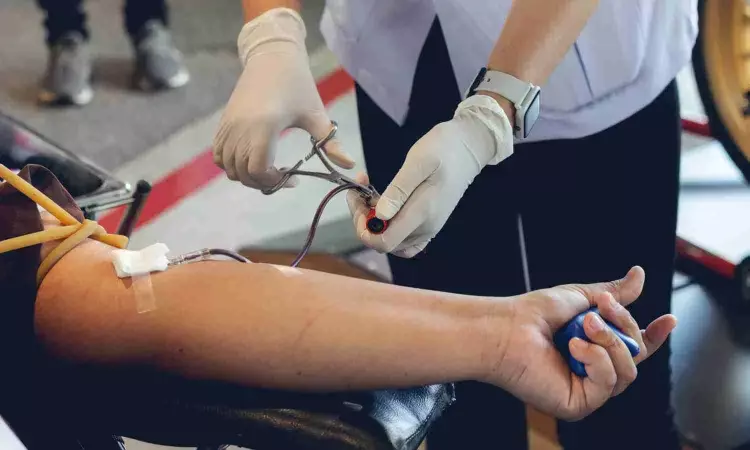- Home
- Medical news & Guidelines
- Anesthesiology
- Cardiology and CTVS
- Critical Care
- Dentistry
- Dermatology
- Diabetes and Endocrinology
- ENT
- Gastroenterology
- Medicine
- Nephrology
- Neurology
- Obstretics-Gynaecology
- Oncology
- Ophthalmology
- Orthopaedics
- Pediatrics-Neonatology
- Psychiatry
- Pulmonology
- Radiology
- Surgery
- Urology
- Laboratory Medicine
- Diet
- Nursing
- Paramedical
- Physiotherapy
- Health news
- Fact Check
- Bone Health Fact Check
- Brain Health Fact Check
- Cancer Related Fact Check
- Child Care Fact Check
- Dental and oral health fact check
- Diabetes and metabolic health fact check
- Diet and Nutrition Fact Check
- Eye and ENT Care Fact Check
- Fitness fact check
- Gut health fact check
- Heart health fact check
- Kidney health fact check
- Medical education fact check
- Men's health fact check
- Respiratory fact check
- Skin and hair care fact check
- Vaccine and Immunization fact check
- Women's health fact check
- AYUSH
- State News
- Andaman and Nicobar Islands
- Andhra Pradesh
- Arunachal Pradesh
- Assam
- Bihar
- Chandigarh
- Chattisgarh
- Dadra and Nagar Haveli
- Daman and Diu
- Delhi
- Goa
- Gujarat
- Haryana
- Himachal Pradesh
- Jammu & Kashmir
- Jharkhand
- Karnataka
- Kerala
- Ladakh
- Lakshadweep
- Madhya Pradesh
- Maharashtra
- Manipur
- Meghalaya
- Mizoram
- Nagaland
- Odisha
- Puducherry
- Punjab
- Rajasthan
- Sikkim
- Tamil Nadu
- Telangana
- Tripura
- Uttar Pradesh
- Uttrakhand
- West Bengal
- Medical Education
- Industry
Whole blood transfusion improves survival in trauma patients presenting with severe haemorrhage: JAMA

Basketball Player’s Vigilance Prevents Wrong Blood Transfusion
USA: A recent cohort study published in JAMA Surgery showed that receipt of a whole-blood (WB) transfusion earlier at any time point within the first 24 hours of ED arrival improved survival in patients presenting with severe haemorrhage. The survival benefit was observed shortly after transfusion.
The study findings are clinically important as the earlier timing of WB administration may offer a survival advantage in actively haemorrhaging patients requiring massive transfusion protocol (MTP).
Significant bleeding due to traumatic injury is the number one cause of preventable deaths in the U.S., with the majority of deaths occurring within six hours. Emerging evidence suggests that the transfusion of whole blood (blood that is not separated into parts) is associated with a survival benefit compared to the traditional use of blood component transfusion (red blood cells, plasma, and platelets) in these patients.
The study from researchers from Boston University Chobanian & Avedisian School of Medicine demonstrates that the earlier one receives whole blood transfusion for severe traumatic bleeding, the greater the chance of survival. However, if this transfusion was delayed by as little as 14 minutes after arriving at the hospital, the survival benefit was significantly reduced.
“These findings may lead to clinicians and hospital systems to consider whole blood as a standard emergency transfusion product incorporated into the massive transfusion protocol,” says corresponding author Crisanto Torres, MD, MPH, assistant professor of surgery at the school. “There may be a similar benefit for using whole blood transfusion at the scene of injury or during transport.”
The researchers analyzed 1,394 patients nationwide who presented to the emergency department with severe traumatic hemorrhage requiring massive transfusions, including whole blood, due to their traumatic injuries. They evaluated if the receipt of early whole blood transfusions was associated with improved survival at 24 hours and 30 days compared to delayed whole blood transfusions in severely bleeding trauma patients receiving component-based therapy massive blood transfusions. Those patients who received whole blood transfusions earlier upon their arrival to the emergency department had improved survival rates.
“Our study indicates a targeted time goal for whole blood administration within 14 minutes of hospital arrival. There is a decrease in survival probability for each minute delay in whole blood transfusion, but the most pronounced reduction in the probability of survival was seen after 14 minutes,” added Torres who also is a trauma surgeon at Boston Medical Center.
Reference:
Torres CM, Kenzik KM, Saillant NN, et al. Timing to First Whole Blood Transfusion and Survival Following Severe Hemorrhage in Trauma Patients. JAMA Surg. Published online January 31, 2024. doi:10.1001/jamasurg.2023.7178.
Dr Kamal Kant Kohli-MBBS, DTCD- a chest specialist with more than 30 years of practice and a flair for writing clinical articles, Dr Kamal Kant Kohli joined Medical Dialogues as a Chief Editor of Medical News. Besides writing articles, as an editor, he proofreads and verifies all the medical content published on Medical Dialogues including those coming from journals, studies,medical conferences,guidelines etc. Email: drkohli@medicaldialogues.in. Contact no. 011-43720751


